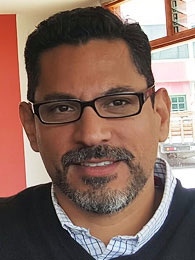
Armando Villalta, Ph.D.
THE VILLALTA GROUP
The Villalta Lab (VLab) is a team of multi-disciplinary scientists with expertise in immunology and muscle physiology. The team consists of talented and culturally diverse student, postdoctoral and staff researchers. We are a highly dedicated group that takes pride in hard work and is passionate about contributing to society by creating high-impact discoveries that advance our understanding of the immune system in muscle disease. When not in the lab, we enjoy visiting one of our many local microbreweries, grilling food, game nights and beach days.
RESEARCH INTERESTS
The overall goal of the research in the VLab is directed towards understanding how immune cells contribute to tissue injury and repair in degenerative and autoimmune diseases of skeletal muscle. We use mouse genetics, single-cell transcriptomics and biosynthetic approaches to study the mechanisms of immune-mediated pathology in muscle disorders. We also strive for translation of our basic science studies by using mass imaging and cytometry for high-dimensional analysis of human muscle to define the cellular and molecular basis of how immune cells contribute to muscle disease in human.
AREAS OF INVESTIGATION
- Innate lymphoid cells regulation of muscle regeneration and fibrosis
We recently made the discovery that innate lymphoid cells (ILC1 and ILC2) are activated by muscle injury and are elevated in dystrophic muscle. We have several genetic mouse models in which ILC1s and ILC2s have been depleted from dystrophic mice. In preliminary studies, we found that stromal progenitors express IL-33 to potently activate ILC2s and the expression of genes associated with fibrosis, suggesting that ILC2s promote muscle fibrosis during muscular dystrophy.For further information on the role of ILC2s in muscular dystrophy please read our recent Cell Reports paper:
- Treg-mediated regulation of macrophage activation and function during muscular dystrophy
The objective of this study is to define how regulatory T cells (Treg) regulate macrophage-stromal interactions in muscle, and how these interactions can be therapeutically manipulated to alter disease progression. In preliminary studies we used single-cell RNA sequencing (scRNAseq) to characterize macrophages in healthy and dystrophic muscle, and found a novel galectin-3+/spp1+ macrophage population. Given the role of galectin-3 and spp1 in fibrosis, we are currently performing studies to test the hypothesis that galectin-3+ macrophages promote muscle fibrosis by promoting the fibrogenic differentiation of stromal progenitors.Please read our STM manuscript to learn more about the role of Tregs in muscular dystrophy:
- Ligand-assisted delivery of tolerogenic therapies to muscle
We are developing novel approaches to deliver tolerogenic therapies to muscle. Currently, we are using novel conjugation chemistries developed by our collaborator at Purdue to link muscle-specific antibodies to a single-chain IL-2 complex engineered by our colleagues at John Hopkins. This approach is expected to deliver IL-2 complex to the muscle and induce Tregs to promote tolerance and suppress muscle inflammation while mitigating off-target effects and global immunosuppression.
- Engineering muscle-specific chimeric antigen receptors (CAR) for regulatory T cells
Synthetic biology has revolutionized multiple sectors of the scientific enterprise. In medicine, the most relevant synthetic biology-inspired therapeutic is the CAR-T cell. More recently this approach has been applied to Tregs with the key goal of generating CAR-Tregs to promote tolerance in autoimmunity. Our lab is developing muscle-specific CARs that targets cell surface muscle proteins as a novel approach to suppress muscle inflammation and induce tolerance to exogenously-introduced therapeutic transgenes.
- Tolerization of dystrophin and adeno-associated virus immunity
Adeno-associated virus (AAV) micro-dystrophin (dys) gene therapy shows great promise to cure Duchenne muscular dystrophy (DMD). We are conducting several multi-disciplinary studies to determine if AAV- and dystrophin-specific immune responses impede on the success of gene therapy, and determine if regulatory T cells (Tregs) mitigate these immune responses in the mdx mouse model of DMD. We are using adjuvant-based immunization methods to induce dystrophin- and AAV-specific T cells, and functional studies to determine if dystrophin- and/or AAV-specific T cells impair muscle function following AAV-dys gene therapy.
- Single-cell transcriptomic approaches for defining the role of the immune system in inclusion body myositis
Translational studies are essential in transforming laboratory findings into novel therapies that positively impact patient health and disease outcomes. In collaboration with our colleagues in the Muscle Biology and Disease Working Group, we are using scRNAseq profiling of immune cells from inclusion body myositis (IBM) patients to define the mechanisms that promote immunological dysfunction in these patients. In addition to gene expression studies, we are profiling the T cell receptor repertoire at single-cell resolution for future antigen discovery effort.
These studies provide a scope of the work conducted in the VLab and highlight our passion in studying the role of the immune system in muscle disease. The multi-disciplinary and innovative approaches we use will advance our knowledge of how the immune system contributes to muscle disease, and provide a path for the development of novel therapeutic strategies to treat this devastating class of disorders.
